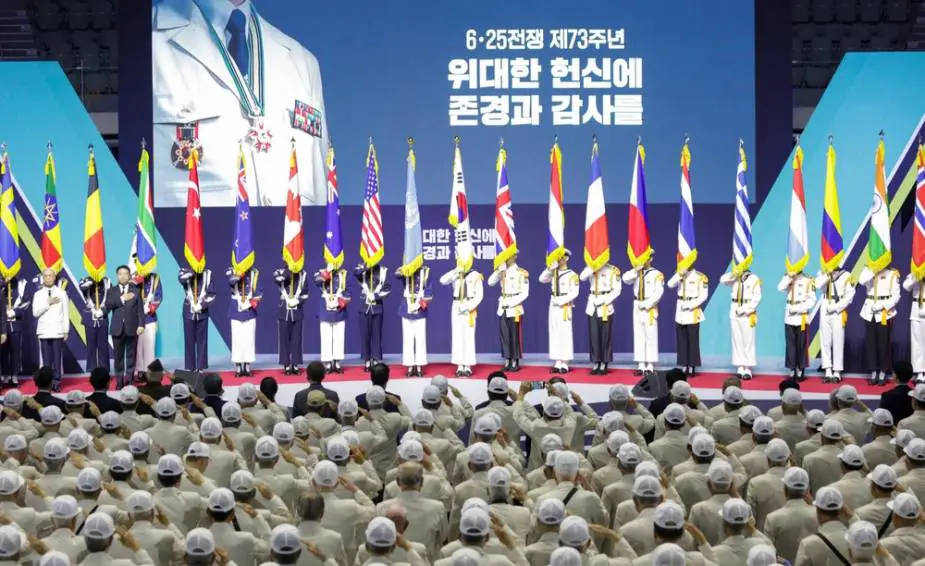Breaking news
US marks 70th anniversary of armistice in 1950-1953 Korean War.
On June 25, 1950, North Korean forces crossed the 38th parallel and attacked South Korea. Three days later, North Korean forces captured South Korea's capital, Seoul. The following week on July 1, the first U.S. ground troops, arrived in Korea to support South Korea. The decision to aid South Korea was made by President Harry S. Truman. In his "Memoirs," published in 1956, Truman states: "If South Korea fell, the communists would attack other nations, resulting in World War III". The communists he referred to were the former World War II U.S. allies China and the Soviet Union, which now supported North Korea. David Vergun, DOD News, reports.
Follow Army Recognition on Google News at this link

Commemorative Ceremony at Jangchung Arena, Seoul, Republic of Korea, on 25 June 2023. The Ministry of Patriots & Veterans Affairs hosted a ceremony to commemorate the 73rd Anniversary of the beginning of the Korean War The Ministry of Patriots & Veterans Affairs hosts this event each year to express gratitude and honor the sacrifices of the Republic of Korea, the USA and the United Nations Member States' veterans who fought for the security of the Republic of Korea from 1950-1953 (Picture source: U.S. Army/Pfc. Gu, Sung Jun, Korean Augmentation To the United States Army)
By early August 1950, the North Korean army had overrun most of South Korea except for a small pocket in the far southeast known as the Pusan Perimeter. During the months of August and September, U.S. Soldiers and Marines, along with United Nations forces, landed in Korea to bolster South Korea's defense.
U.N. forces besides the U.S., were the United Kingdom, Canada, Turkey, Australia, Philippines, New Zealand, Thailand, Ethiopia, Greece, France, Colombia, Belgium, South Africa, Netherlands and Luxembourg. U.S. forces landed on the western port city of Inchon on Sept. 15, and two weeks later, U.N. forces captured Seoul. The following month saw U.N. forces crossing the 38th parallel into North Korea, capturing Pyongyang, the capital of North Korea, and advancing to the Yalu River, the northern boundary of North Korea and China. In late October 1950, Chinese forces crossed into North Korea to aid their ally. By January 1951, Chinese and North Korean forces recaptured Seoul. By March 1951, U.N. troops recaptured Seoul.
On April 11, 1951, Truman relieved General Douglas MacArthur, who had led the U.N. Command. MacArthur had wanted to expand the war into China to stop the Chinese support to the North Korean invader, which was against the directives of the president, who didn't want a wider conflict, which would likely involve the Soviet Union. "We were in Korea in the name and on behalf of the United Nations. This 'unified command' which I had entrusted to [U.S. Army Gen.] Douglas MacArthur, was a United Nations Command, and neither he nor I would have been justified if we had gone beyond the mission that the United Nations General Assembly had given us," Truman states in "Memoirs," an account of his presidency.
By the latter part of 1951,1952 and 1953, heavy fighting continued, with the front line stabilizing in a stalemate in the vicinity of the 38th parallel.
Dwight D. Eisenhower became president on Jan. 20, 1953, and on July 27, 1953, the Korean Armistice Agreement was signed, (temporarily) ending the war. Prisoners were exchanged and South Korea gained a bit of territory northeast of the 38th parallel. About 37,000 Americans lost their lives during the Korean War and over 92,000 were wounded and 8,000 were missing. South Korea sustained 1.3 million casualties, including 415,000 dead. Casualties among other U.N. forces totaled 16,500, including 3,100 dead.
No peace treaty was ever signed between North and South Korea and in the decades since the Korean War, North Korean forces have conducted numerous cross-border incursions and other acts of aggression. U.S. forces and U.N. representatives are still in South Korea with the goal of preventing another war. U.S. Forces Korea is responsible for supporting and training joint South Korea-U.S. forces and United Nations Command multinational forces.
Defense News July 2023























